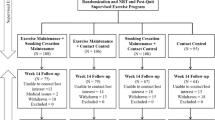Abstract
Rationale
Recent research has shown that 10 min of moderate intensity exercise reduce smoking withdrawal symptoms and desire to smoke in acutely abstinent smokers. The aim of the current study was to determine whether the reductions are related to participant expectation of these effects.
Materials and methods
Forty-five sedentary participants who had smoked ten or more cigarettes per day for at least 3 years reported their expectation of the effects of exercise on smoking withdrawal symptoms. Approximately 1 month later, participants were randomly assigned to one of three groups after 11–15 h of overnight smoking abstinence. Each group read either a positive, negative or neutral statement concerning exercise effects on smoking withdrawal symptoms. They rated their expectation again and then completed 10 min of moderate intensity exercise on a stationary bicycle ergometer. Using standardised scales, participants rated smoking withdrawal symptoms and desire to smoke at 10, 5 and 0 min before exercise, then at 5 and 10 min during exercise and 15 and 20 min post-exercise.
Results
Expectation of exercise effects on withdrawal were manipulated in the predicted directions. No significant group main effects were found for any symptom. Significant reductions in symptoms and desire to smoke occurred during and after exercise regardless of participant expectation.
Conclusions
Ten minutes of moderate intensity exercise can lead to reductions in desire to smoke and smoking withdrawal symptoms, which are not due to the participant’s expectation of exercise effects. These findings support the use of short periods of exercise as an aid to smoking cessation.

Similar content being viewed by others
References
Berger B, Owen D, Motl R, Parrott A (1998) Relationship between expectancy of psychological benefits and mood alteration in joggers. Int J Sport Psychol 29:16
Blair SN, Haskell WL, Paffenbarger RS, Vranizan KM, Farquhar JW, Wood PD (1985) Assessment of habitual physical activity by a seven-day recall in a community survey and controlled experiments. Am J Epidemiol 122:794–804
Borkovec TD, Nau SD (1972) Credibility of analogue therapy rationales. J Behav Ther Exp Psychiatry 3:257–60
Daniel JZ, Cropley M, Ussher M, West R (2004) Acute effects of a short bout of moderate versus light intensity exercise versus inactivity on tobacco withdrawal symptoms in sedentary smokers. Psychopharmacology 174:320–26
Daniel JZ, Cropley M, Fife-Schaw C (2006) Exercise and smoking withdrawal symptoms: acute effects of 10 minutes of moderate exercise versus 10 minutes of a distraction task. Addiction 101:1187–92
Desharnais R, Jobin J, Cote C, Levesque L, Godin G (1993) Aerobic exercise and the placebo effect: A controlled study. Psychosom Med 55:149–54
Franklin BA (2000) American college of sports medicine guidelines for exercise testing and prescription. Lippincott, Williams and Wilkins, Philadelphia
Heatherton TF, Kozlowski LT, Frecker RC, Fagerström KO (1991) The Fagerström test for nicotine dependence: a revision of the Fagerström tolerance questionnaire. Br J Addict 86:1119–27
Karvonen J, Vuorimaa T (1988) Heart rate and exercise intensity during sports activities: practical application. Sports Med 5:303–12
Kline P (1993) The handbook of psychological testing. Routledge, London
Marcus B, Rossi R, Selby V, Niaura R, Abrahams D (1992) Self-efficacy and the stages of exercise behaviour change. Health Psychol 11:60–66
O’Halloran P, Murphy G, Webster K (2002) Measure of beliefs about improvements in mood associated with exercise. Psychol Rep 90:834–40
Perkins K, Epstein L, Stiller R, Marks B, Jacob R (1989) Chronic and acute tolerance to the heart rate effects of nicotine. Psychopharmacology 97:534
Pierce TW, Madden DJ, Siegel WC, Blumenthal JA (1993) Effects of aerobic exercise on cognitive and psychological functioning in patients with mild hypertension. Health Psychol 12:291
Salmon P (2001) Effects of physical exercise on anxiety, depression, and sensitivity to stress: a unifying theory. Clin Psychol Rev 21:33–61
Schwarz N (2002) Situated cognition and the wisdom of feelings: cognitive tuning. In: Feldman, BL, Salovey, P (eds) The wisdom in feelings. Guilford, New York, pp 1014–1026
Taylor A, Katomeri M, Ussher M (2005) Acute effects of self-paced working on urges to smoke during temporary smoking abstinence. Psychopharmacology 181:1–7
Taylor AH, Ussher M, Faulkner G (2007) The acute effects of exercise on cigarette cravings, withdrawal symptoms, affect and smoking behaviour: A systematic review. Addiction 102:534–543
Thayer R, Peters D, Takahaski P, Birkhead-Flight A (1993) Mood and behaviour following moderate exercise. Pers Individ Differ 14:97–104
Thomas SG, Reading J, Shepard R (1992) Revision of the Physical Activity (PAR-Q) Questionnaire. Can J Sport Sci 14:338–345
Tiffany S, Drobes D (1991) The development and initial validation of a questionnaire on smoking urges. Br J Addict 86:1467–1476
Ussher M, Nunziata P, Cropley M, West R (2001) Effect of a short bout of exercise on tobacco withdrawal symptoms and desire to smoke. Psychopharmacology 158:66–72
West R, Russell M (1985) Pre-abstinence smoke intake and smoking motivation as predictors of cigarette withdrawal symptoms. Psychopharmacology 87:407–415
Williams JMG, Watts FN, MacLeod C, Mathews A (1997) Cognitive psychology and emotional disorders. Wiley, Chichester
Wilson T, Lisle D, Kraft D, Wetzel C (1989) Preferences as expectation driven inferences: effects of affective expectations on affective experience. J Pers Soc Psychol 56:519–530
Youngstedt S, Dishman R, Cureton K, Peacock L (1993) Does body temperature mediate anxiolytic effects of acute exercise? J Appl Physiol 74:825–883
Author information
Authors and Affiliations
Corresponding author
Rights and permissions
About this article
Cite this article
Daniel, J.Z., Cropley, M. & Fife-Schaw, C. Acute exercise effects on smoking withdrawal symptoms and desire to smoke are not related to expectation. Psychopharmacology 195, 125–129 (2007). https://doi.org/10.1007/s00213-007-0889-6
Received:
Accepted:
Published:
Issue Date:
DOI: https://doi.org/10.1007/s00213-007-0889-6




